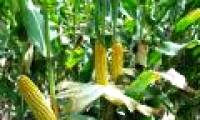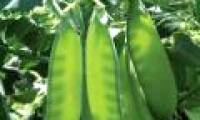
Recent research by scientists has shown that nanoparticles may be the solution to increasing food production in the future but do not affect the use of environmental resources.

During the Stone Age around 6,000 years BC, farmers knew how to use cattle manure such as cows, sheep, goats and pigs as a slow-release fertilizer for plants.

The scientists explained that the increase in crop production is due to silicate rock that helps protect plants against pests and diseases, while improving the structure and

Pests threaten crops around the world, greatly affecting food security of many countries. The usual solution used by most farmers is spraying pesticides.

International experts believe that genetically modified plants may help increase agricultural production, while Vietnamese scientists still fear it will affect human health.

It is the result of the scientific project 'Creating a grafting plant between tomato and potato' that biotechnology engineer Nguyen Thi Trang Nha (SN 1987, has just graduated from

Farmers in poor countries are losing traditional crop varieties due to the tight management of these companies, making it difficult for them to cope with climate change in

IAEA provides countries with information and skills to apply nuclear technology to better assess and manage national water resources.

Researchers are developing a new information technology that can help scientists predict how crops will respond to different environmental conditions.

Raising spiders, stink bugs, bees and then releasing them in the field to destroy harmful public species instead of using chemicals sprayed on fruits and vegetables, successfully
 Recent research by scientists has shown that nanoparticles may be the solution to increasing food production in the future but do not affect the use of environmental resources.
Recent research by scientists has shown that nanoparticles may be the solution to increasing food production in the future but do not affect the use of environmental resources. During the Stone Age around 6,000 years BC, farmers knew how to use cattle manure such as cows, sheep, goats and pigs as a slow-release fertilizer for plants.
During the Stone Age around 6,000 years BC, farmers knew how to use cattle manure such as cows, sheep, goats and pigs as a slow-release fertilizer for plants. The scientists explained that the increase in crop production is due to silicate rock that helps protect plants against pests and diseases, while improving the structure and
The scientists explained that the increase in crop production is due to silicate rock that helps protect plants against pests and diseases, while improving the structure and Pests threaten crops around the world, greatly affecting food security of many countries. The usual solution used by most farmers is spraying pesticides.
Pests threaten crops around the world, greatly affecting food security of many countries. The usual solution used by most farmers is spraying pesticides. International experts believe that genetically modified plants may help increase agricultural production, while Vietnamese scientists still fear it will affect human health.
International experts believe that genetically modified plants may help increase agricultural production, while Vietnamese scientists still fear it will affect human health. It is the result of the scientific project 'Creating a grafting plant between tomato and potato' that biotechnology engineer Nguyen Thi Trang Nha (SN 1987, has just graduated from
It is the result of the scientific project 'Creating a grafting plant between tomato and potato' that biotechnology engineer Nguyen Thi Trang Nha (SN 1987, has just graduated from Farmers in poor countries are losing traditional crop varieties due to the tight management of these companies, making it difficult for them to cope with climate change in
Farmers in poor countries are losing traditional crop varieties due to the tight management of these companies, making it difficult for them to cope with climate change in IAEA provides countries with information and skills to apply nuclear technology to better assess and manage national water resources.
IAEA provides countries with information and skills to apply nuclear technology to better assess and manage national water resources. Researchers are developing a new information technology that can help scientists predict how crops will respond to different environmental conditions.
Researchers are developing a new information technology that can help scientists predict how crops will respond to different environmental conditions. Raising spiders, stink bugs, bees and then releasing them in the field to destroy harmful public species instead of using chemicals sprayed on fruits and vegetables, successfully
Raising spiders, stink bugs, bees and then releasing them in the field to destroy harmful public species instead of using chemicals sprayed on fruits and vegetables, successfully





 NASA's 'Ninth Planet' Shows Signs of Being Friendly to Life
NASA's 'Ninth Planet' Shows Signs of Being Friendly to Life Why did American astronauts have to be quarantined when returning to Earth?
Why did American astronauts have to be quarantined when returning to Earth? China surprises the world by building a cable-stayed bridge 'above the clouds'
China surprises the world by building a cable-stayed bridge 'above the clouds' Why do women sleep less and wake up more than men?
Why do women sleep less and wake up more than men? Revealing the secret inside the stuffed animal claw machine, from there, summarizing experience to help you increase your winning rate many times over
Revealing the secret inside the stuffed animal claw machine, from there, summarizing experience to help you increase your winning rate many times over What would happen if you dug a hole through the Earth and jumped in?
What would happen if you dug a hole through the Earth and jumped in? Camera takes a photo that lasts 1,000 years
Camera takes a photo that lasts 1,000 years Was there nuclear war in ancient times?
Was there nuclear war in ancient times?